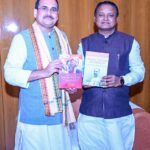DISPLAYING BOORISH NON-NEHRUVIANISM’’
- By : Anirban Ganguly
- Category : Articles
There is reluctance, even hostility, among those who consider themselves to be Nehru’s heirs, to evaluate the country’s first Prime Minister dispassionately
It was unfortunate, but perhaps not all that unexpected, to see Jawaharlal Nehru’s self-proclaimed political heirs display a very boorish non-Nehruvian spirit on the occasion of the launch of his 125th birth anniversary. Instead of talking or dwelling on ‘Nehru’s soaring idealism’ and his indefatigable action in realising that which he thought was best for India and her people, instead of calling for an impartial re-assessment of the first Prime Minister’s legacy and life, instead of rejoicing at the fact that the present Prime Minister, Mr Narendra Modi, has called for taking Nehru to the masses once more and has decided to observe it through an intense drive to inculcate and arouse the spirit of cleanliness in young minds and learners, Nehru’s political and filial descendents endlessly fumed about ‘poison’, ‘poisonous’ and ‘poisoning’ — interpreting Nehru’s legacy through the tincture of division, negativity and clash. Any attempt to re-evaluate Nehru has been slammed by this section, as antithetical to national harmony or simply as an attempt to ‘destroy’ all that Nehru stood for.
Interestingly it is this spirit of intolerance, evolved and consolidated during the last six decades by Nehru’s political descendents and their Marxian drummers, that has engineered the rise of a mono-narrative, or mono-discourse on his life and achievements. To be fair, there have been notable exceptions, but largely this has been the trend of intolerance. The occasion should have been welcomed as an opportunity to discuss, assess and re-state the many views of Nehru. It offers, if internalised in a true democratic spirit, an ideal setting for generating a multi-narrative and of drawing out the many ideas of India — ideas that were hitherto subsumed or suppressed by an undeclared but deftly implemented ‘official’ dictate that allowed a one-dimensional reading and ‘popularisation’ of Nehru as a spotless ‘god.’
It is fascinating to know how a true quest for unravelling Nehru led some of the most active minds in post-independent India’s political world to undertake an arduous labour of research and cohesive expression. Prolific socialist, Madhu Limaye, for example, was driven to produce his opus study of Nehru and the Mahatma, ‘Mahatma Gandhi and Jawaharlal Nehru: a historic partnership (1916-1948)’, when confronted with a fundamental question. “I have often asked myself as to why did Gandhi pick up from among half a dozen prominent leaders — Rajaji, Vallabhbhai, Rajendra Prasad, Abul Kalam Azad, Jawaharlal Nehru and Subhas Chandra Bose — Jawaharlal Nehru as his heir despite the latter’s known basic differences with him? This question troubled me because it is difficult for me to conceive Jawaharlal rising to pre-eminence either without Gandhi’s decisive intervention in India’s politics or Gandhi’s deliberately and persistently promoting his succession.”
According to his own confession, this question “interested” and “mystified” Limaye, “in turns” for “fifty years” generating a “restless curiosity” that led him to undertake a multi-volume ‘study in interaction’.
The works of some other able and articulate assessors of Nehru and his epoch — before and after independence — also deserve to come to surface during this period in an effort to evolve a wide national discourse on his persona. CR Rajagopalachari’s writings in his hugely popular, Swarajya, Minoo Masani’s writings on Indian politics and economy and his interventions in Parliament, KM Munshi’s voluminous documentation of our struggle for freedom and constitutional politics through a painstaking collation of letters, statements and documents, Pilgrimage to Freedom (1902-1950), NVGadgil’s non-academic yet moving memoir of working in free India’s first Cabinet under the dominating personality of Nehru, Government from Inside, are among some records and narratives that help in understanding the other assessment, the other dimension and opens the discourse to various layers and perceptions.
In a candid admission to a party colleague, Nehru once wrote, “I have repeatedly made a mess of things; but, I hope, I have not forgotten the major ideals which Gandhiji taught us.”
This anniversary offers an ideal opportunity to finally look into that question and settle it for posterity.

















